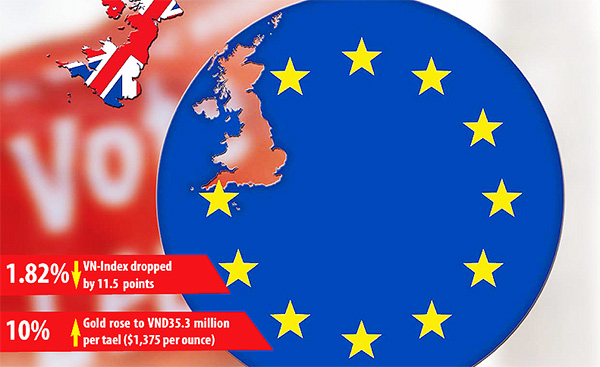Dong insulated from Brexit
fallout
Vietnam’s
economy as well as its currency is unlikely to be adversely affected by the
UK’s decision to opt out of the European Union.
As the votes
counted in the UK referendum last week returned in favour of “Leave” rather
than “Remain”, global economies reacted accordingly and markets have
stumbled. However, experts predict that the impact on Vietnam’s economy will
be minimal.
“Britain may
have voted to exit the EU, and markets are in a tizzy, but Asia should come
through this episode with only a few scratches. The trade exposure to the UK
is minimal for most Asian economies,” noted Frederic Neumann, co-head of
Asian Economics Research at HSBC Corporation.
Economic impacts
Vietnam’s
direct export to the UK was reported to be around 3 per cent of 2015 GDP, yet
according to Neumann, the impact on Asian economies, including Vietnam’s
would be more material should the broader EU were to experience a growth
slump as a consequence of Brexit.
“The UK is
not a significant direct destination for Vietnam’s exports, so we don’t see
any direct medium- to long-term impact on growth itself for Vietnam,” said
Chidu Narayanan, a Singaporean-based economist for Asia at Standard Chartered
Bank.
“What I
would be more concerned about is how demand in general from the West is
evolving – if the US is at the latest stage of its growth cycle, then that is
more of a concern in terms of final demand from Vietnam’s perspective, rather
than this instance of Brexit,” Narayanan told VIR.
Meanwhile,
according to Maybank Kim Eng (MBKE) Research, Vietnam’s economy will be
driven by internal factors, including credit growth, GDP growth, fiscal
balance, corporate earnings, and other domestic events.
“The impacts
from the Brexit on overall trade for Vietnam would be therefore likely
insignificant from a trade-with-the UK point of view,” noted MBKE,
highlighting that Vietnam’s export performance is driven by products
including phones, computers, electronic products, agriculture, and textiles,
rather than any country in particular where the UK is not an exception.
According to
MBKE, the main implication for Vietnam following the Brexit relates to the
EU-Vietnam Free Trade Agreement, which concluded late last year. “As the deal
has not yet been ratified by the European Parliament, negotiations may have
to start again, separately, between Vietnam and the UK, and Vietnam and the
EU.”
VND stability
The Brexit
result last Friday shook up the global currency markets, sending the pound
itself to its lowest level in 30 years and saw the euro and other major
currencies dropping accordingly. However, the Japanese yen moved in the
opposite direction, settling at under 100 a dollar.
“For foreign
currencies in general, a “Leave” might mean that it’s a significant risk of
sentiment and the AXJ [Asia ex-Japan] FX, in general, might see some
depreciation pressure,” noted Standard Chartered’s Narayanan. “With respect
to the VND, we think it would be slightly less volatile than most, and more
stable than other Asian currencies.”
The
reference rate was posted at VND21,845 a dollar on June 24 on the central
bank’s website, while on the previous day, the VND/USD rate was quoted at
VND21,847. Across commercial banks, the greenback was traded between
VND22,260-22,380 a dollar, an increase of VND5-50 a dollar compared to the
previous day. Given the trading band of 3 per cent, banks could thus trade
their dollar within the VND21,190-21,500 band.
“VND/USD will
be driven by trade balance, (which has been in surplus of $1.6 billion in the
first five months of the year), and people’s sentiment, which depends on more
internal factors, such as new government policies and transparency in terms
of economic growth, attracting FDI, and environmental issues,” said MBKE.
According to
the Ho Chi Minh City-based securities company, the central bank’s more
accommodative stance supporting growth in the second half of 2016, along with
a wider than previously estimated fiscal deficit, may put pressure on the
dong in the months to come. “So far this year, the VND has appreciated 0.9
per cent against the USD.”
HSBC’s
Neumann said from an Asian perspective, two policy decisions need to be
watched especially closely. “If Japan’s central bank stands idly by, without
intervening directly in FX markets, and foregoes further easing either next
week at an extraordinary policy meeting or its scheduled meeting in July, the
yen could soar.”
In addition,
Neumann added that fears over material renminbi weakness could then quickly
reverberate around the region leading to other currencies to fall as well,
and possibly by more.
The moves by
the Bank of Japan and the People’s Bank of China, according to Neumann,
should be closely watched as the former could hurt lending and portfolio
investment while the latter would hurt growth.
By Trang Nguyen, VIR
|
Thứ Hai, 27 tháng 6, 2016
Đăng ký:
Đăng Nhận xét (Atom)

Không có nhận xét nào:
Đăng nhận xét